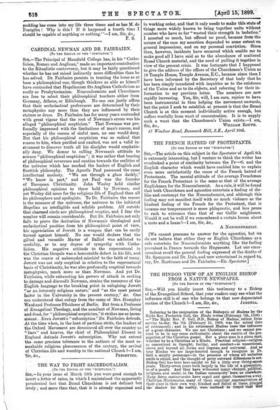CARDINAL NEWMAN AND DR. FAIRBAIRN.
[To THE EDITOR OF THE "SPECTATOR."] SIR,--The Principal of Mansfield College has, in his " Catho- licism, Roman and Anglican," made an important contribution to the Ritualistic controversy, but it may be fairly questioned whether he has not raised indirectly more difficulties than he has solved. Dr. Fairbairn persists in treating the issue as at base a philosophical one, though thinkers as able as himself have contended that Hegelianism fits Anglican Catholicism as easily as Presbyterianism. Nonconformists and Churchmen are .free to select their philosophical teachers either from Germany, Athens, or Edinburgh. No one can justly affirm that their ecclesiastical preferences are determined by their metaphysics any more than they are influenced by their stature or dress. Dr. Fairbairn has for many years contended with great vigour that the root of Newman's errors was his alleged "philosophical scepticism." That Newman was pro- foundly impressed with the limitations of man's reason, and especially of the reason of sinful man, no one would deny. But that his philosophical scepticism was so radical that reason to him, when purified and exalted, was not a valid in- strument to discover truth all his disciples would emphatic- ally deny. We demur to calling Newman's attitude to science " philosophical scepticism "; it was rather that bearing of philosophical reverence and caution towards the realities of the universe which has marked the leaders of English and Scottish philosophy.. The Apostle Paul possessed the same intellectual modesty. "We see through a glass darkly," "We • -know- in part," and yet Paul was the founder of European Christianity. John Wesley held similar philosophical opinions to those 'held by Newman, and yet Wesley did more for the religious life of England than all its philosophers and aporogists. s To Dr. Fairbairn the reason is the measure of the universe, the universe to the initiated Hegelian an intelligible and soluble problem. All outside that charmed circle are philosophical sceptics, and fear the number will remaidconsiderable. But Dr. Fairbairn not only fails to prove the derivation of Newman's theological and ecclesiastical position from his philosophical, point of view, his appreciation of Jowett is a weapon that can be easily turned against himself. No one would 4eclare that the gifted. and versatile Master of Balliol was addicted to credulity, or to any degree of sympathy with Catho- licism. His negative attitude to the supernatural in the Christian Gospels was a lamentable defect in his life, and was the source of unbounded mischief to the faith of many. Jowett was not only sceptical in relation to the supernatural basis of Christianity, he was alsolnofoundly sceptical towards Metaphysics, much more so than Newman, And yet Dr. Fairbairn, while exhausting his powers of attack in seeking to damage.and discredit Newman, strains the resources of the English language to the breaking point hi eulogising Jowett "as an intensely religious nature," and "as the most potent factor in : the University in the present century," citc. One can understand that eulogy from.the camp of Mrs..Humphry Ward and Professor Pfleiderer of Berlin.. But from a Professor of Evangelical Theology, and the assailant of Newman, living and dead, for ." philosophical scepticism," it strikes me as incon- eistent.. Even Jowett's " sulseription ".Dr. Fairbairn defends. At the time when, in the-heat of partisan strife, the leaders of the Oxford. Movement are denounced all over the country as "liars" and knaves, the chief of Philosophical Dissent in England defends Jowett's subscription. Why not extend the. same gracious tolerance to the authors of the most re- markable religious phenomenon of the century, the revival of Christian life and worship in the national Church 9—I am,






































 Previous page
Previous page